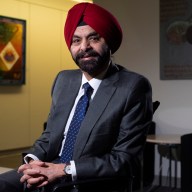Gabriel Byrne may be the first person to talk about “The Brady Bunch” while talking about Eugene O’Neill. The Golden Globe-winning actor is about to star in “Long Day’s Journey into Night” on Broadway, and while chatting about it he can’t help think about the ’70s TV show, which he watched as a young man in Ireland. “One is a complete fabrication of what a family is,” he says. “The other is holding up a mirror to the reality of what it means to be a member of a family.” Byrne, 65, doesn’t rattle off canned answers to questions; he lets his mind roam. Soon we’re talking about addiction, about how the Bing Crosby classic “Going My Way” is propaganda for the Catholic Church (but still compelling), about whether today’s superhero movies, of which he’s not a fan, carry negative messages. Eventually we get to the subject at hand: the drama “Louder Than Bombs,” in which he plays the father of a family still reeling years later from the suicide of his wife (played in flashbacks by Isabelle Huppert). But even this film, from acclaimed Norwegian filmmaker Joachim Trier (“Reprise,” “Oslo, August 31”), has so many heady ideas that he stays thoughtful and restless. RELATED: Interview: Don Cheadle on “Miles Ahead” and not giving Miles Davis a Wikipedia biopic One idea explored here is the disconnection between your character and his teenage son, played by Devin Druid, who tends to isolate himself with his computer and gadgets. I don’t like to ask, “How was it working with such-and-such an actor,” but Isabelle Huppert is someone particularly special. You’ve lived in America for a long time now, but I’m sure you still can still look at it with a certain detachment and maybe bewilderment, especially now. RELATED: Interview: Tom Hiddleston on “I Saw the Light” and not dropping his solo record anytime soon On a lighter note: Your character is a former actor, and there’s a scene in the film where your sons, including the older one played by Jesse Eisenberg, look at one of his old clips, and it’s actually a scene from the “Hello Again,” a 1987 Shelley Long vehicle in which you had a key role. How did that get in the film? But it made me think that you age in a different way on screen, which is one of the things that’s brilliantly done in “Sunset Blvd.,” which is the most extreme case. Most people don’t have themselves frozen like that in time. Although I’ve physically changed, I’ve also changed psychologically, emotionally and mentally, too. Those insecurities I had are not there so much anymore. Life does that to you. You ask yourself, “Does it matter if I f— up this take? Or does it matter if I just commit to it, do my best and enjoy it as much as I can?” Still, it was slightly unnerving having Jesse say, “I can’t believe you looked like that.” I was caught in a moment of reacting as my character and as myself — Lex Luthor making fun of me.
I don’t know if there’s such a disconnect. Let’s say you were a parent brought up after the war, in the idealistic Eisenhower years. Then you get to the ’60s and you suddenly you’ve got Vietnam and miniskirts and LSD and civil rights. For parents that must have been as shocking as computers. At least parents can share the computers. I don’t know if what’s separating parents from their kids today is anything strange or new.
I’ve always admired her. Still, on the first morning of shooting I found myself sitting across from a nervous actress, worried if she was going to succeed or not. It really reminded me that every film, every play, every job you do is essentially the first time. If you were in a job where you were in the same place over years, you know your coworkers. Every time you start a film you have to get to know people you’ve never met before, and work on material you’ve never seen before, in a location you’ve maybe never been before. It takes a few days or even weeks to relax. I remember reading that Charles Laughton had it written in his contract that he could re-film the first day’s work. I understand exactly what he meant.
What shocks me about America is, despite its incredible size and the discrepancies over culture and religion, it’s still an amazingly isolated society. It’s not just cultural; it’s political. We don’t want to hear about what’s going on in the rest of the world. You wonder about the eroding trust in the media. It’s not so much what they report; it’s what they don’t report. A bomb explodes in a village or a drone goes off in Yemen, and it hardly gets any coverage. Sometimes I look at the headlines in the newspaper and it’s about basketball and a guy who was caught in a drugs bust. These are the main stories you see people reading in the subway. You think, “What? This isn’t what’s really going on.”
[Laughs] I told Joachim, “I don’t know how I feel about that.” But to me it wasn’t about looking at a clip of an old movie I did. There’s a pathos to it. That scene was shot in the first two weeks I’d ever set foot in America. That was my young, naive self sitting across from someone I’d never heard of, who used to be mobbed during lunch hours. I was playing what the studio thought I was best suited for, which was light romantic comedy. I had a horrible experience making the film, to be absolutely honest.
Gabriel Byrne on the generation gap, America and ‘The Brady Bunch’
Follow Matt Prigge on Twitter @mattprigge


















